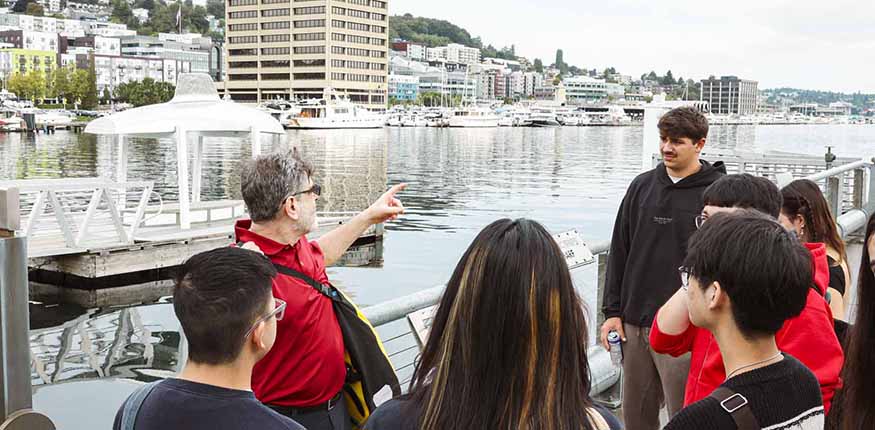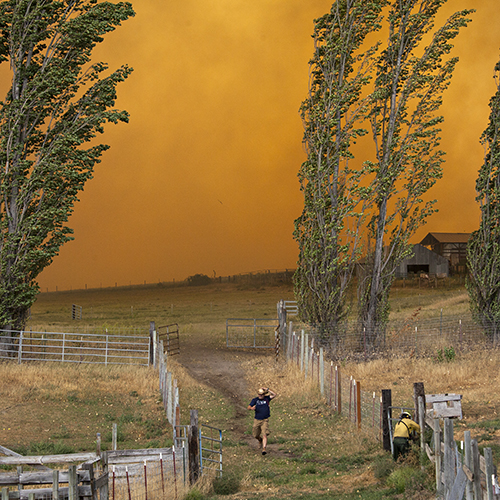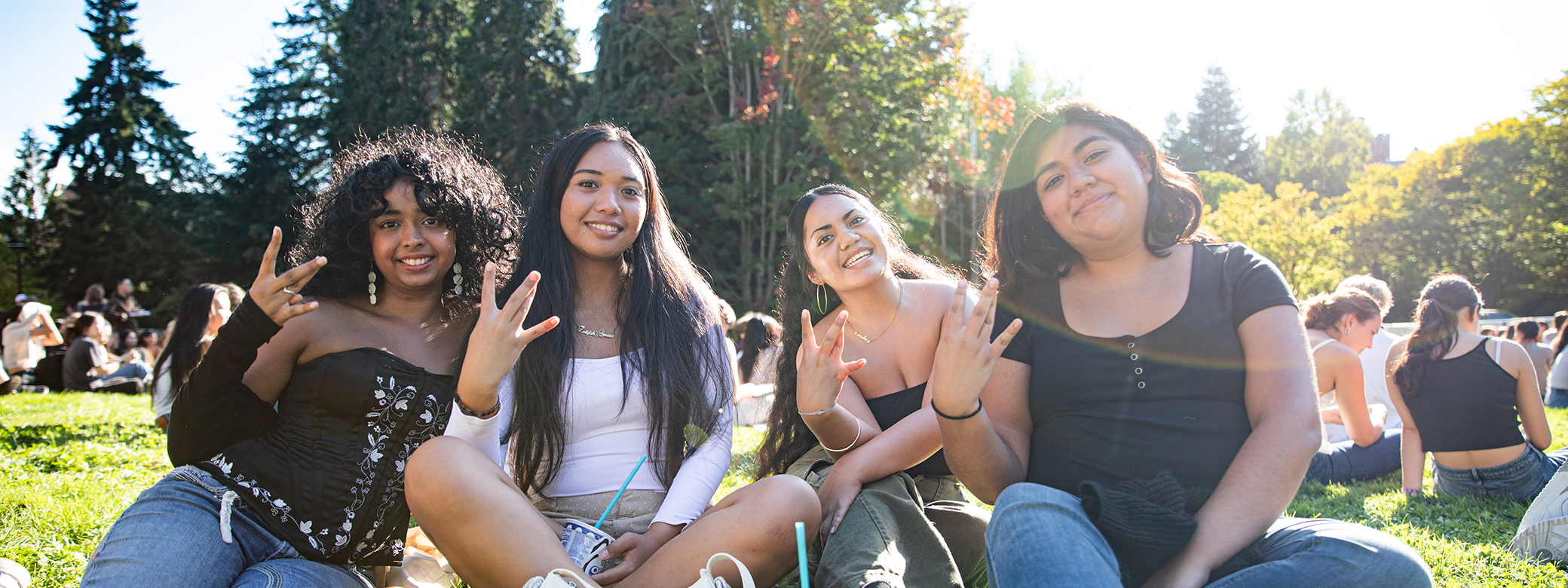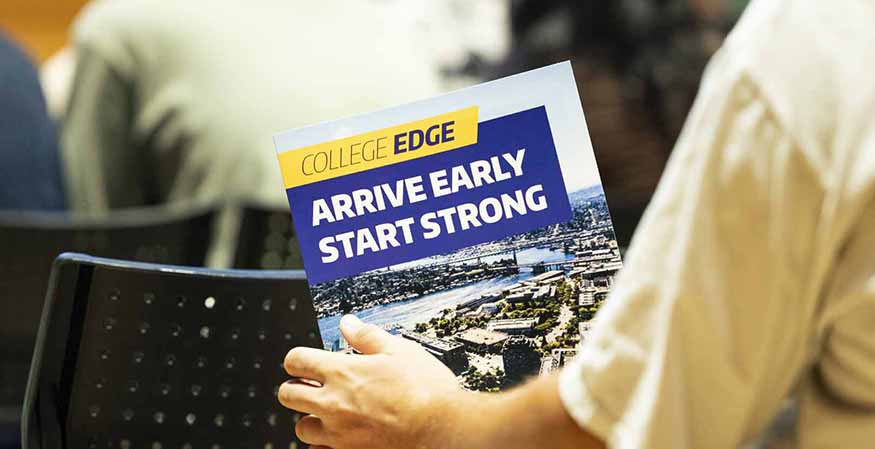"This is just the beginning of a great adventure here," says a faculty member in this video about the College Edge program. Video by Juan Rodriguez.
The first few months of college can be a huge transition for students. As they familiarize themselves with new surroundings and develop new friendships, they also must navigate a full load of courses that may be far more demanding than their high school classes. Fortunately, the UW College of Arts & Sciences offers College Edge to ease that transition.
College Edge is an optional four-week program held before the start of fall quarter. Open to all UW (Seattle campus) first-year students, the program includes a five-credit academic course with dozens to choose from, opportunities to build friendships and explore the campus, and the option to settle into a dorm before fall quarter. All classes are small, taught by professors who get to know their students well.
“It’s a chance to make connections in small hands-on seminars with UW faculty,” says Elizabeth Copland, College Edge program director. “For both the students and faculty, it almost feels akin to a study abroad experience because you really get to bond. You have this intense four-week period together. At its heart, College Edge is a deep relationship building program.”
A Sense of Place
College Edge was introduced in 2024 as a relaunch of Early Fall Start (EFS), which had been offered by UW’s Continuum College from 2004 through 2022. (Continuum College is still involved, processing College Edge registrations and payments.) The updated program has a new academic advising component to ensure that students have a strong start at the University, and an optional early career lab experience called gesture. Both College Edge and gesture are based in The Center for 21st Century Liberal Learning (C21).
College Edge emphasizes place-based learning, with faculty incorporating field trips — appropriate to their course content — as part of their curriculum. Since classes are three hours long, four days a week, there is ample opportunity to leave the confines of a classroom for all or part of a class session. “Wherever the class can go on campus, it’s going to introduce the students to new things,” says Copland.

Field trips have included the Burke Museum, Henry Art Gallery, UW Planetarium, University Libraries Special Collections, wǝɫǝbʔaltxʷ – Intellectual House, faculty labs, and other campus destinations, as well as off-campus sites like the International District and Seattle-area museums.
For a course exploring the history of the Seattle World’s Fair, students spent significant time at Seattle Center. A course for Indigenous students incorporated a canoe experience, carving, and conversations with Indigenous elders. A course on birdsong and music included daily visits to campus locations to listen to birds. “After that class, the students commented that they hear birds singing everywhere now,” says Copland. “It just really changed the way that they engaged with the landscape.”
Easing into College Life
Copland speaks from personal experience when she talks about how impactful the College Edge program can be. As an incoming UW student in 2004, she participated in the first year of Early Fall Start, the predecessor to College Edge. “I’m still friends with people I did the program with,” she says, “so I know those connections can last.”

Current first-year student Ben Robison signed up for College Edge as a way to adjust to independent living and make friends. He succeeded on both counts. “By the start of fall quarter, I already had a good understanding of where things were [at the UW] and how things worked,” he says. “The biggest thing was that I wasn’t starting a full course schedule at the same time as I was trying to adjust to a new environment. It was like easing into a pool rather than jumping in, and I much preferred it.”
First-year international student Helen Wu also appreciated the gentle introduction to student life and the friendships she made through College Edge. “With the same course schedule, it was easier to bond with other students, hang out together, and form a close-knit group of friends before fall quarter even began,” she says. “Having that strong social network, I feel a stronger sense of belonging.”
Wu says that social network extends to faculty. “It was an amazing and rare experience to build a close relationship with professors,” she says. “Even after the program ended, I still reach out to my College Edge professor when needed. This experience of working with such great faculty has made me more confident and excited about the professors I will meet in the future.”
An Edge for Faculty
College Edge faculty, many of whom teach graduate students or advanced undergraduates during the academic year, also appreciate the opportunity to develop close connections with incoming students. Some continue to have group dinners with their College Edge students long after the month-long program ends.
They also have the opportunity to explore topics beyond their usual course offerings. In 2024, College Edge course topics ranged from forensics to environmental activism to Japanese film and fiction to the impact of food on the brain. (See the sidebar for more College Edge courses.)

“The challenge and excitement for College Edge faculty is taking content and teaching to a first-year audience,” says Copland. “It’s a chance to engage with a fresh-faced group. And I think that can influence what they do in their other work.”
That’s been the case for Stephen Groening, associate professor of cinema and media studies, who taught a 2024 College Edge course titled “How to Be a Person,” which explores the search for belonging and identity that is central to the human experience and the role of technology in that.
“I get to try new approaches and different assignments,” Groening says of teaching in College Edge. “In some ways, it’s like a teaching lab for me. I think it has helped me rein in the workload in my courses during the academic year, as I see how quickly even students with only one course get overwhelmed. And it has changed how I treat undergraduates, since in College Edge I get to learn more about them as people and their lives. It’s a helpful reminder of how sincere and genuine they are, how much they want to succeed, and also how lost they can feel at first in such a big university. I honestly don’t know why more admitted students don’t do College Edge.”
You have this intense four-week period together. At its heart, College Edge is a deep relationship building program.
Copland agrees. The program is a particularly good deal for out-of-state and international students, since the UW charges in-state tuition for all College Edge participants. Some incoming students don’t sign up because extending the academic year holds no appeal, but many more simply aren’t familiar with College Edge.
That’s something Copland is hoping to change.
In 2024, about 400 first-year students participated, with about 35 courses offered. Copland anticipates expanding the number of course offerings and students in 2025, with a maximum of 25 students per course. The benefits of the program are so powerful that she wants as many students as possible to experience it.
“The program tends to attract faculty who are really excited to get to know students well and who have the energy to make those bonds and want to continue to foster them,” Copland says. “That part of it is so beautiful. I loved getting to witness it.”
Interested in the 2025 College Edge program? Visit collegeedge.washington.edu for information about the program and upcoming information sessions.
More Stories

AI in the Classroom? For Faculty, It's Complicated
Three College of Arts & Sciences professors discuss the impact of AI on their teaching and on student learning. The consensus? It’s complicated.

What Students Really Think about AI
Arts & Sciences weigh in on their own use of AI and what they see as the benefits and drawbacks of AI use in undergraduate education more broadly.

10 Arts & Sciences Stories from 2025
As 2025 comes to a close, we're sharing some of the year's top Arts & Sciences stories.

